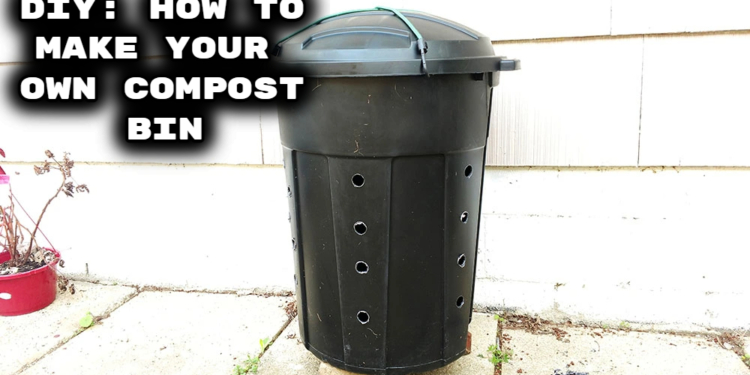Creating your own compost is a task that suits everyone, whether you’re just starting your gardening journey or consider yourself a seasoned pro. It is a fantastic method to repurpose yard waste, including grass clippings, dry leaves, and kitchen scraps like vegetable peelings. The resulting blend of nutrient-rich, decomposed organic materials does wonders for plants, whether applied around them or mixed into the soil. The first step on this eco-friendly adventure involves making your compost bin, and a straightforward DIY approach involves repurposing a trash can with a few simple steps.
What You Need
To kick off your composting journey, gather these essentials:
Lidded, outdoor trash can (between 30 and 40 gallons)
Choose one with wheels for easy manoeuvrability and UV tolerance for durability.
Power drill
For creating ventilation holes in the compost bin.
Paddle drill bit
Attach it to the drill for efficient hole drilling.
Step-by-Step Guide
Step 1: Prep the Bin
If you’re using an old trash can, give it a thorough rinse to eliminate any remnants of non-biodegradable materials. For a new bin, remove tags or packaging. Opting for a bin with wheels facilitates easy movement around the garden and ensures it’s UV tolerant for prolonged exposure to sunlight.
Step 2: Drill Holes
Attach the paddle bit to the drill and start drilling holes a few inches from the lid. Space them approximately three inches apart, covering both the width and length of the bin. Repeat this process on all sides.
Step 3: Clean Out Bin
Once the drilling is complete, wash out the trash can to remove any plastic shavings. Your compost bin is now ready for action.
Composting Tips and Tricks
Starting your compost pile requires attention to detail in material selection and encouragement for efficient decomposition. Here are some tips:
- Two composting methods: Hot and cold. Hot composting utilizes nitrogen, carbon, air, and water for a faster breakdown within a few months. Cold composting involves collecting materials in a bin and allowing them to decompose naturally over a year.
- Good materials include fruit and vegetable scraps, eggshells, coffee grounds, grass clippings, dry leaves, finely chopped wood, shredded paper, straw, and sawdust from untreated wood.
- Avoid composting diseased plant parts, treated wood, animal faeces, weedy seeds, or anything containing meat, oil, fat, dairy, or grease.
Before long, your garden will reap nutrient-rich compost benefits, whether establishing a new garden bed or revitalizing existing soil.
Conclusion
In just a few simple steps, you’ve created an effective compost bin, turning kitchen and garden waste into a valuable resource for your plants. Experiment with composting techniques; soon, your garden will thank you with a bounty of healthy growth.
Start composting today and witness the magic of recycling in your own backyard!
Frequently Asked Questions
Q: How do I make a homemade compost bin?
A: Use a plastic bin, compost tumbler, or follow the instructions here to create a bay system. Trench composting is also a viable option, all discussed in detail in this guide.
Q: What material do I need to make my own compost bin?
A: It can be as straightforward as a plastic bin with holes or a worm bed.
Q: How do you start a compost bin for beginners?
A: Explore the DIY options outlined in the first section of this guide.
Q: Does a compost bin need air holes?
A: Absolutely. Adequate air is crucial for the aerobic process of breaking down composting material.
Q: Does compost need sun?
A: While not mandatory, sunlight can aid in heating the pile and catalyzing the composting process.
Q: How often should compost be turned?
A: Turn your compost pile every 4 to 5 weeks.
Q: How long does it take for compost to break down?
A: Depending on the material, the composting process can range from weeks to years.








Discussion about this post